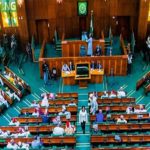The member representing Ede North and Ede South in the House of Representatives, Hon Bamidele Salam (PDP-OSUN) on Wednesday lamented that over 40 million Nigerians who are carriers of the sickle cell gene have no easy access to quality health care in the country.
Hon Salam made the revelation in Abuja while speaking at a public hearing on five health-related bills before the House
The lawmaker whose bill which seeks to establish the National Agency for Sickle Cell disease and other heritable blood disorder for the treatment, prevention, control, management of and research on sickle cell disease and other heritable blood disorder in Nigeria said Nigerians suffering from the ailment deserved quality attention like others.
While quoting figures from the World Health Organisation, Salam also declared that at least 100,000 babies die from the disorder in Nigeria every year, making it the number one sickle cell endemic country in Africa and the country with the highest-burden of sickle cell disorder in the world.
He lamented that it was unfortunate that despite the large number of Nigerians carrying the gene, there was no single legal framework in Nigeria for the prevention, control and treatment of the endemic, while about 150,000 children were being born with the disorder in Nigeria every year.
According to him “Sickle cell disease is a group of blood disorder typically inherited from a person’s parents. The most common type is known as sickle cell anaemia. Sickle cell anaemia is a condition in which there are not enough healthy red blood cells to transport adequate oxygen through the body
“This leads to a rigid, sickle-like shape under certain circumstances. These sickle-shaped cells can stick to blood vessel walls blocking the flow of oxygen to organs, causing excruciating pains, popularly called crises
“Nigeria has the largest population of people with Sickle cell disease in the world, with over 150,000 babies born with it every year. Sadly, there is no single legal framework in Nigeria for the prevention, control and treatment of this endemic.”
He pointed out that the overall intendment of the bill was to improve the lives of people suffering from Sickle cell disease, recognize the disease as a serious and debilitating illness, and allocate new resources to monitoring, researching and treating it.
The lawmaker added that the Bill seeks to formulate and implement policies, guidelines and strategies on sickle cell disease and other heritable blood disorders; facilitate the engagement of all tiers of government and all sectors on issues of sickle cell disease and other heritable blood disorders prevention, care and support.
The bill he also said would also advocate for the mainstreaming of sickle cell disease and other heritable blood disorders interventions into all sectors of the country; promote, improve and support research and learning in sickle cell disease and other heritable blood disorders, create awareness on sickle cell disease and other heritable blood disorders; protect patients’ rights including the right to humane treatment and freedom from abuse; and promote and coordinate partnerships and collaborations with national and international organizations.
According to him, “despite being one of the most common generic and blood diseases, and the fact that we have known about it for several decades, Nigerians with Sickle cell disease continue to face a variety of barriers when trying to access care.
“Individuals with Sickle cell disease not only suffer from chronic, debilitating pains and are at the risk for other serious complications, many of them also lack access to the medications they need.
“This bill will provide a means of ensuring that we have the resources to better understand this disease and to maintain access to services for those affected by it.
“Other diseases that impact a similar or even smaller number of people receive more attention, and at times, more resources to help the patients.
“It is not out of place to therefore allocate necessary resources to monitor, research and treat it. The proposed legislation marks a significant step forward in our efforts to combat sickle cell on all fronts- research, surveillance, prevention and treatment.
We owe it to those suffering every day to do everything possible to find a cure”.
While declaring open the public hearing, the Speaker of the House, Femi Gbajabiamila the reiterated the commitment of the House to ensuring improved access to healthcare, improved funding for healthcare research and training as well as providing for healthcare professionals in the country.
According to him, “when we resumed office in the 9th Assembly, we set out a Legislative Agenda that outlined the scope of our governing ambitions; the problems we intended to solve and the challenges we hoped to overcome.
“In that document, we made commitments to improve access to healthcare services for all our nation’s people, increase funding for healthcare research, and improve the mechanisms for training and providing for our healthcare professionals amongst other things.
“Our gathering here today, and tomorrow, is in partial fulfilment of these ambitions. We are here to review five bills currently under consideration in the House of Representatives”.
“Bills before the House are mere legislative proposals, for now, the primary purpose of the public hearing is to give stakeholders from across the country the opportunity to make contributions that will improve these Bills so that the ambitions that underpin them may be achieved in full.
He stressed that the success of the hearing would depend entirely on the quality of the contributions that would be made through the memoranda submitted to the Committee and the conversations that would be held during
the public hearing.
YOU SHOULD NOT MISS THESE HEADLINES FROM NIGERIAN TRIBUNE
We Have Not Had Water Supply In Months ― Abeokuta Residents
In spite of the huge investment in the water sector by the government and international organisations, water scarcity has grown to become a perennial nightmare for residents of Abeokuta, the Ogun State capital. Over 40m sickle patients have no access to medical care in Nigeria, Reps member cries out ; Over 40m sickle patients have no access to medical care in Nigeria, Reps member cries out ; Over 40m sickle patients have no access to medical care in Nigeria, Reps member cries out ; Over 40m sickle patients have no access to medical care in Nigeria, Reps member cries out.
WATCH TOP VIDEOS FROM NIGERIAN TRIBUNE TV
- Let’s Talk About SELF-AWARENESS
- Is Your Confidence Mistaken for Pride? Let’s talk about it
- Is Etiquette About Perfection…Or Just Not Being Rude?
- Top Psychologist Reveal 3 Signs You’re Struggling With Imposter Syndrome
- Do You Pick Up Work-Related Calls at Midnight or Never? Let’s Talk About Boundaries






